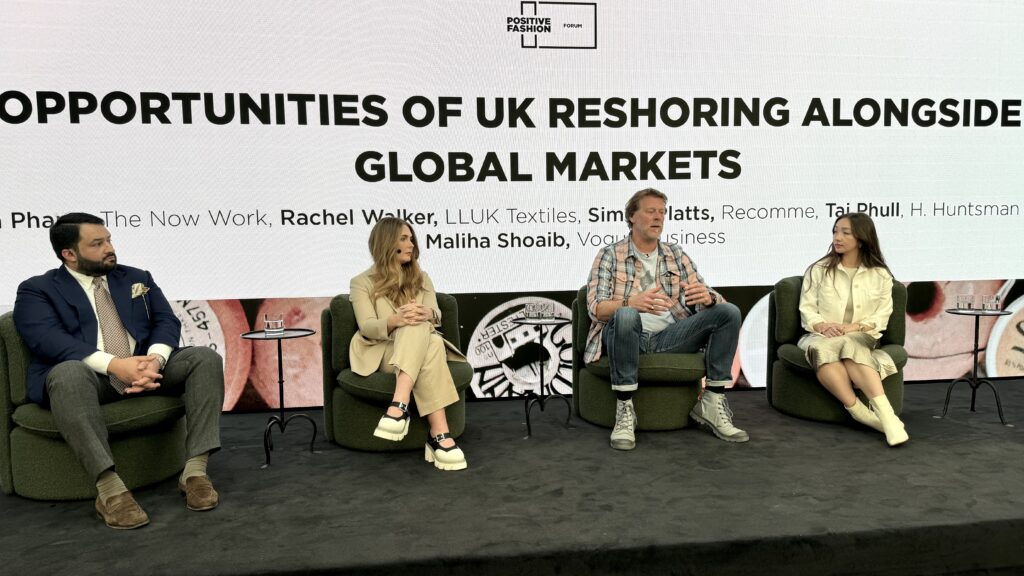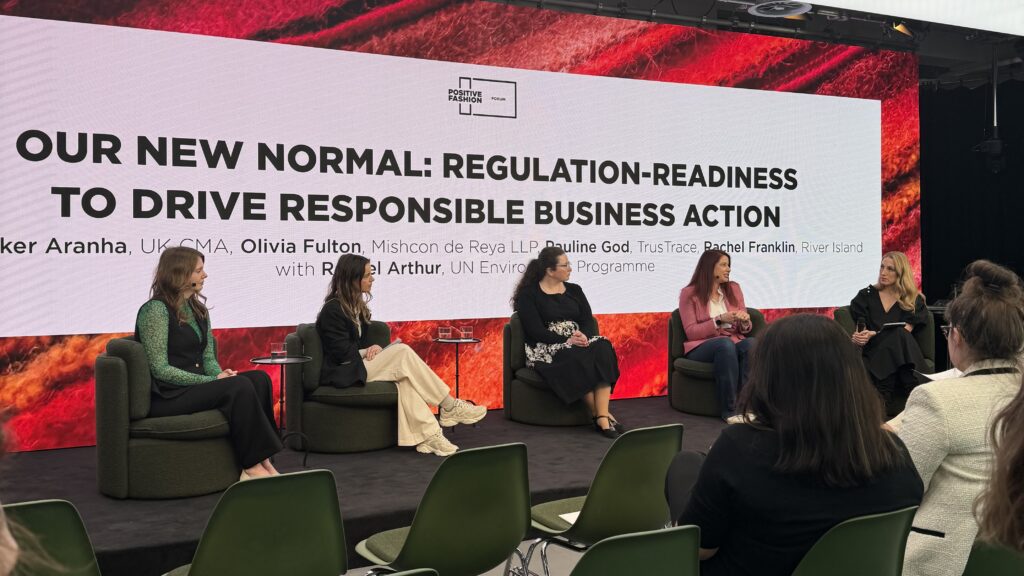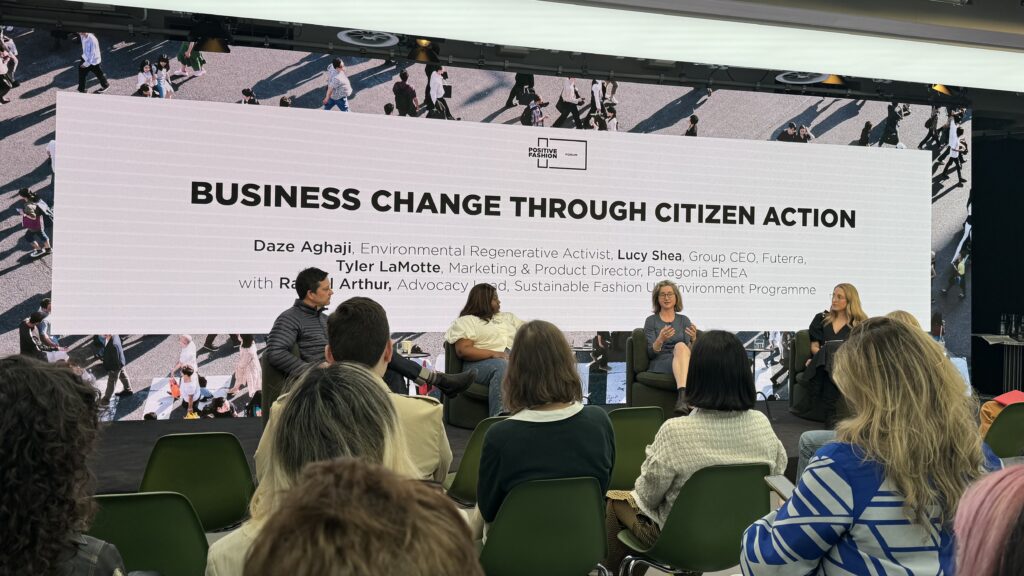Last week we attended the British Fashion Council’s annual Institute of Positive Fashion (IPF) Forum at 180 Strand in London.

It was a fantastic event showcasing innovative sustainable fashion brands, expert speakers and genuinely productive workshops.
Our main takeaway was that the debate is no longer around who’s responsible - customers, businesses or governments - it's around how all of these stakeholders can work together to drive change.
Whether it’s preparing for incoming regulatory changes, rethinking supply chains, encouraging public engagement or reimagining textiles, it’s vital that we collaborate wherever we can to change the fashion industry for the better.
A clear signal on this is the door-to-door alterations and repairs company SOJO - they started with an offer that was direct to consumers, then began partnering with brands and retailers to offer it as a service/guarantee, and are now pushing for right to repair regulation. You can sign their Pledge to Repair here.
Hannah Phang spoke on a panel about ‘Opportunities of UK Reshoring Alongside Global Markets’ along with Rachel Walker (Luxury Lockstitch UK), Simon Platts (Re Up Recomme), Taj Phull (H Huntsman & Sons Ltd) and moderated by Vogue Business reporter Maliha Shoaib. They looked at the opportunities, complexities and strategic considerations involved in partially returning textile and apparel manufacturing to the UK. They discussed:
- Their own experiences with manufacturing both abroad and in the UK, and the environmental and social benefits of re-establishing a productive textile manufacturing trade in Britain.
- Taj spoke about some of the needlessly long-winded processes that currently exist and require textiles to be sent from country to country, which can waste time, money and airmiles.
- He also spoke about some of the partnerships Huntsman has developed to encourage
- Rachel spoke about the need to properly support local artisans, including by guaranteeing a real living wage.
- Simon shared that he has previously worked with brands that choose not to work with manufacturers in the UK, who fear that the risk of underpaid workers is too high.
- Everyone agreed that UK textile manufacturing needs a rebrand and for effort to be put into making it an appealing career.
- Hannah discussed the need for government support, as well as brands understanding the appeal of having their supply chains nearby in order to make them transparent and accessible to their customers.
- Hannah also spoke about the need for future fit skills - such as circular design, sustainable materials, new business models, and a focus on clothing repair and upcycling - in order for us to lead a more exciting conversation about what the industry needs to look like for consumers and for the planet.
- Through The Now Work, we’ve seen clearly that the future of work is changing. People want to be empowered, supported, and trusted as such, not just told what to do. Work culture is a crucial part of the conversation and all organisations need to look at how they can adapt to the shifting drivers and motivators of the workforce.

We heard from industry experts Cecilia Parker Aranha (UK Competition and Markets Authority, or CMA), Olivia Fulton (Mishcon de Reya LLP), Pauline God (TrusTrace), Rachel Franklin (River Island) and Rachel Arthur (UN Environment Programme) about how companies can prepare themselves for incoming responsible business regulation. Some of the key takeaways included:
- The CMA is working with well known brands to start implementing new filtering options for specific material types when shopping online, as well as better labelling, and more accessible information about supply chain certifications.
- The law firm Mishcon de Reya LLP has found that their clients are particularly interested in educating themselves on where the biggest risks lie for their business and what they should be prioritising.
- There was agreement that it’s vital that all companies in this space start preparing now, as the road to compliance is a long one.
- They discussed the need for greater collaboration in the industry and how businesses can be reluctant to share vital information with their competitors.
- One of the most important things to consider when making sustainability claims is whether or not your customer is likely to understand them - put yourself in their shoes.
- The CMA is working on providing more information in easily accessible language.
- Preparing for regulatory changes can be expensive - it’s vital to have c-suite support in order to unlock the necessary resources.
- Everyone who touches your product is a stakeholder, and it’s essential to engage your whole supply chain in this process.
- We need as much alignment as possible between governments to prevent these requirements tying companies in knots.
- We were reminded that it’s possible for the public to feed back during the consultation stage of these regulations.
- In the workshop portion, we spoke to SMEs who are concerned about the resource needed to ready themselves for these regulations, and the need for government support and guidance.
- We also talked about the need for positive guidance that shows the benefits of these changes.

We also attended a session on ‘Business Change Through Citizen Action’, featuring Daze Aghaji (Environmental Regenerative Activist), Lucy Shea (Group CEO, Futerra), Tyler LaMotte (Marketing & Product Director, Patagonia EMEA) and also moderated by Rachel Arthur. They covered:
- Patagonia’s recent change into operating as a ‘purpose trust’.
- Patagonia’s Action Works platform and recent ‘Unfashionable’ campaign.
- Daze spoke beautifully on the idea that everyone already has agency - we need to recognise it rather than bestow it.
- She also explored the idea of agency as a muscle that can be built up;
- How when we feel like active citizens, activism is second nature;
- And having the humility to understand that you’re working for something much larger than yourself and also having the confidence to try anything.
- Lucy spoke about how the public has already been able to change the dial on important issues like veganism and single use plastics.
- She shared Futerra’s Good Life Goals campaign which helps people take individual action to support the SDGs.
- And about how the Intergovernmental Panel on Climate Change (IPCC) has officially recognised individual action as key to mitigating climate change in their AR6 Working Group III Report.
There were so many other great sessions and innovators in attendance - we really recommend joining next year if you’re able to.
